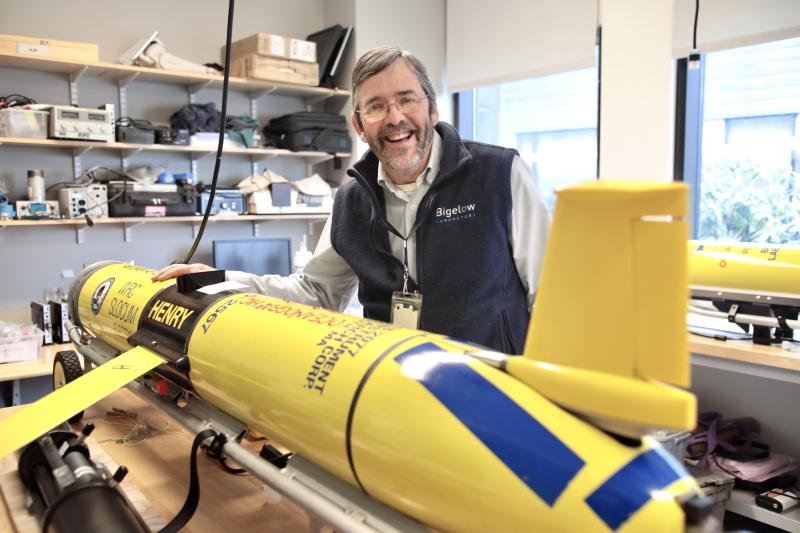Barney Balch said he wears glasses due to his time looking through a microscope. But that lens of experience has given him perspective on the Gulf of Maine. This month, Balch retired from Bigelow Laboratory for Ocean Sciences in East Boothbay after a more than 50-year career. He recently reflected on the changes he has seen and what they could mean for the future.
Balch first came to Boothbay Harbor as a teenager to work with Charlie and Clarice Yentsch. He had worked with them before. New opportunities arose when the Yentsches founded Bigelow Laboratory in 1974, and his Maine life revolved around research and talking science after hours at The Thistle Inn. He went on to get a doctorate from Scripps Institution of Oceanography, several postdoctoral jobs and a teaching job at the University of Miami. Then, in 1995, went to work at Bigelow Laboratory, where he would stay.
A scientist makes observations, and keeps meticulous notes and data. If Balch were to give his teenage self advice, he said it would be to be especially careful about measurements. That dedication to consistency, details and statistical mathematics helped power his research exploring environmental changes.
The biggest change Balch has seen in the Gulf of Maine, which extends from Massachusetts to Nova Scotia, is in its temperature. His research found that at the average depth of the Gulf, around 500 feet, temperatures increased around 0.16F per year for about the last two decades. He said the change was nonlinear and increased faster towards present day.
“The deep waters don't change very fast, and to see that happen over time scales of a couple of years ... the temperature is huge,” he said.
Balch’s work has also focused on tiny phytoplankton and their major impacts on ocean health. During photosynthesis, plants convert carbon dioxide into food in a process called primary production. In the ocean, almost all primary production is performed by phytoplankton, which makes them a foundation for ocean health.
“I've had a lot of focus on the productivity, and that's what everyone is interested in,” he said. “The Gulf of Maine has been such an important fishery place, and that primary productivity feeds all the fisheries.”
According to Balch, temperature changes are connected to primary production. However, temperature is not the only factor; others such as availability of nutrients, connected ocean systems and climate patterns are also an influence. Ultimately, Balch discovered primary production in the Gulf of Maine has rapidly declined to one third of what it was 20 years ago.
“The productivity change, in my view, (is) immense,” he said.
Uncovering these patterns has been a long, steady process. Balch and other Bigelow Laboratory scientists started the North Atlantic Time Series (NATS) in 1998, collecting a suite of measurements at the same geographic transect across the Gulf of Maine.
“We had this line where we went back and forth hundreds of times across the Gulf of Maine over the years,” he said. “It's because we ran that line over and over, boring as it may be, but it's the same place … We have the statistical precision to say that this change is real as opposed to it's within the noise.”
Balch said the depth of information from NATS has increased his own perception of change from researching tiny phytoplankton that fuel the food web to sweeping changes across the Gulf of Maine. He said the power of a time series is, the information grows exponentially more significant as it continues. That is one reason he incorporated comparable data from scientists making observations from as early as 1912, including his and Yentsch's work in the 1970s.
“Those sorts of things have expanded my vista to be looking at longer timescale change,” he said. “So, while I'd like to think the observations I was making in the 1970s give me some ability to talk about climate change, really, it was starting a systematic time series in the late '90s that has given me the horsepower to talk about climate change in the Gulf of Maine.”
As his perspective has grown, so has his ability to explore the issues with more sophisticated technology. He has access to vast amounts of data that dwarfs earlier collections. However, converting that information into knowledge takes humility.
“When you're studying any natural systems, be it the Gulf of Maine or CO2, or planet Earth, there has to be a certain humility that these systems are complicated,” he said. “You must approach this in a humble way because Mother Nature has so many curveballs.”
Even after a lifetime of research, Balch is consistently impressed with the Gulf of Maine’s complexity. The issues, except for one, come in shades of grey. “The only real black and white issue we have is carbon dioxide,” he said.
As climate change has altered the Gulf of Maine, public perception around climate change has changed. Balch said if he was to talk about climate change several decades ago, people would not give him the time of day, and talking about carbon would mean nothing to a person on the street. “Now, every newspaper article that's published talks about fossil fuel carbon. There's an awareness now, even if people still aren't totally on board,” he said.
He has seen a change in how people interact with him. During his early career, people did not really understand what he does. Now, at public talks and lectures, audiences are asking complicated questions, and Balch sees that as a positive sign.
Balch hopes society can harness that curiosity and curb its use of fossil fuels to slow the changes.
“I tend to be an optimist, and I think there is much, much more of an awareness of the importance of these phenomena … (But) we need to stop the big cycles, the carbon dioxide going into the atmosphere, to have any chance of surviving.”































